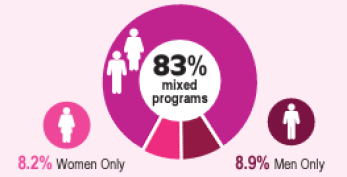

Applying interventions designed to reduce and manage the symptoms of substance use disorders.
Background: People with severe substance use disorders require long-term rehabilitative care after the initial treatment. There is, however, a deficit in the availability of such care. This may be due both to inadequate medical...
This webinar provides information about:
Cannabis is used throughout the Nordic countries, with a particular increase in use among young adults.
Markets and attitudes towards the drug have evolved, therefore there is a need to understand follow societies response to its use.
...In collaboration with the Ministry of Health of the Government of Serbia, UNODC supported the implementation of the UNODC/WHO substance use disorder treatment facility survey to map existing treatment capacity. The results of the survey...
People who have experienced serious mental health issues are three times more likely to smoke than the wider population.
This summary, plus infographic, describes the Smoking Cessation Intervention for People with Severe Mental Ill...
Second of four bulletins recapping 16 reviews for the American Psychological Association featuring expert advice and amalgamations of research findings on different aspects of the client-therapist relationship. With the overview of the...

The Recovery Research Institute have developed a new website that aims to answer the most common questions asked about addiction.
Addiction 101 addresses questions such as:
Impressively wise, unprecedentedly comprehensive, backed by the American Psychological Association, and based on expert assessments and 16 new evidence reviews, the overview featured in this analysis has claims to being the single most...
UNODC has compiled a selection of educational materials and flyers that provide information on drug dependence treatment and care.
The resource has been translated into several languages and covers topics including:
Time to Act! outlines pragmatic and concrete actions, following the UN General Assembly Special Session 2016 (UNGASS 2016), for prevention of non-medical use of controlled substances, treatment of drug use disorders, social protection and...
Opioid Use disorder is one of the most challenging forms of addiction facing health care systems around the world. The treatment of opioid dependence is important to reduce its health and social consequences and to improve the well-being...
Research findings amalgamated for the American Psychological Association show that outcomes of psychosocial treatments are substantially improved when clients and therapists agree on goals and methods and form collaborative relationships...
Share the Knowledge: ISSUP members can post in the Knowledge Share – Sign in or become a member